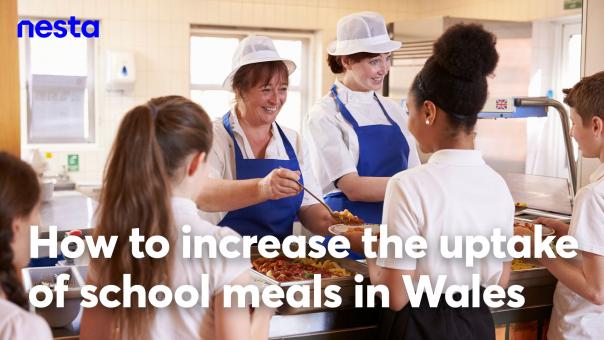
In September 2022 the Welsh Government began the rollout of a national policy to provide a free healthy school meal to all Welsh primary school pupils by the end of the 2024 academic year.
With this move, Wales joined a group of only a few countries with a universal free school meal policy for primary schoolchildren. Although we might expect that every pupil would accept their free lunch entitlement, many do not.
Not only do free school meals represent an opportunity for families to save money on their weekly food shop, several studies have suggested that on average they are considerably more healthy than packed lunches.
Food eaten in school is an important part of children's diets, making up 17% of meals and snacks eaten by primary schoolchildren. Consequently, increasing uptake of free school meals represents a valuable opportunity to improve the health of children’s diets.
Discovering how parents and children feel about school foods
In Spring 2023, we visited primary schools in Cardiff, Caerphilly and Torfaen to understand on-the-ground school meals delivery, how circumstances varied between different schools and councils as well as where we could potentially test new ways - or interventions - to increase take-up.
We spoke to council catering managers, head teachers, chefs, lunchtime supervisors and pupils of various ages. This provided us with really rich insight which was integral to our intervention design.
We learned that there are limited opportunities for parents to connect with school food currently. A residual effect of the Covid-19 pandemic is that schools and councils have not resumed many of the in-person outreach activities that enable parents to connect with the school community. For most parents, their only touchpoint with school food is through feedback from their children. Children’s hesitancy to try unfamiliar dishes or their perceived dislike of certain dishes were also a barrier.
Both pupils and staff told us that most children prefer a combination of school meals and packed lunches, where they choose the school lunch only when they are certain they will like what is on the menu.
Developing concepts to engage parents in school meals
Nesta developed ideas for several interventions which aimed at providing parents with more touch points to connect with school food and reducing their barriers to access. We narrowed these ideas down to four, which we brought to our design workshops in schools for initial testing:
- Video messages from school chefs
- A meal kit box
- Universal school meal take-up month
- Social norm nudges (SMS and parent communication platform pushes)
Testing our ideas in schools
We tested these prototypes in several Welsh primary schools, actively engaging parents and children in the intervention design and adaptation. We ran 16 design workshops across four schools during which we spoke to 53 parents and approximately 80 children.
The feedback we received emphasised the importance of trust-building. For parents, trust is centred around confidence that their children will eat enough so as to not be hungry, and that the food they eat is of high quality. They also need to trust that their children have enjoyable social experiences during their lunch breaks.
What mattered most to pupils overlapped in some areas with parents, but what was unique to them was their need to trust that trying new foods at school should be accompanied by a familiar low-risk alternative - they did not want to go hungry if they did not like something on the menu.
The most common barriers to signing children up for school meals were a perceived lack of menu choice, fussy eating habits, anxiety around new foods, or a concern from parents that special dietary needs could not be met.
Children revealed that social pressures and friendship influences were also an important part of their lunchtime experience. Wanting to sit with friends and attractively packaged snacks and sweet foods in lunch boxes were also a powerful lure from school meals.
As the testing phase concluded, we brought councils and headteachers together to assess the prototypes, interpret the parents’ and children’s feedback and generate ideas for improving the intervention designs.
Next steps
Our findings indicated the universal school meal take-up month concept had the greatest potential to cost effectively increase uptake in a way that doesn't make excessive demands on school resources. However, certain other supporting interventions and measures, such as taste testing and pupil engagement, may be required to drive its success.
We have been refining our intervention prototypes over the summer with the intention of piloting a universal school meal take-up month and supporting interventions over next academic year. We are now reaching out to schools and councils in Wales to take part in the pilot.
Any school or council leaders who would like to discuss this with us, please contact Jonathan Bone jonathan.bone@nesta.org.uk. Funding will be available to councils that participate. More details on this project can be found at https://www.nesta.org.uk/project-updates/testing-new-ideas-to-increase-the-uptake-of-free-school-meals-in-wales/